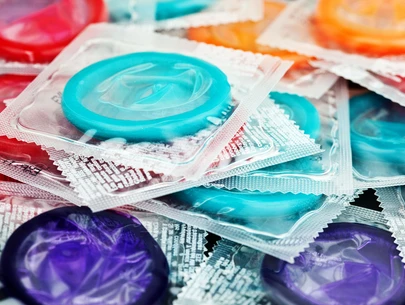On this page
Key points
- Many tools are available to help prevent HIV.
- You can choose not having sex, activities with lower chances of HIV transmission, never sharing needles, and using condoms.
- You can also use HIV prevention medicines such as PrEP or PEP.
- If you have HIV, you can prevent transmitting HIV to others.
You can prevent HIV. There are more tools than ever before that put the power of prevention in your hands!
Back to topKnow your status
Getting tested for HIV is the only way to know your HIV status. This important information can help you make decisions to prevent getting or transmitting HIV.
- If your test result is negative, you can take actions to prevent HIV in the future. Many tools are available! Choose the option (or options!) that work best for you.
- If your test result is positive, you can take medicine to treat HIV . Taking your HIV medicine can help you live a long, healthy life and prevent the passing of HIV to your partners.
Talk with your partner
Discussing your HIV status with your partner and making sure you understand their HIV status is another great way to help prevent HIV. Conversations should include:
- Your HIV status
- When you were last tested
- What types of prevention methods you use
- What types of risks you are comfortable with
Explore safer behaviors
Choose sexual activities with little to no chance of transmitting HIV
Sex is the primary way that HIV passes from person to person. Since HIV mainly passes through sexual contact, your choices about sexual activities and partners can help prevent HIV:
- Not having sex or limiting your number of sex partners make it less likely you will come into contact with HIV.
- Some types of sex have a higher chance of passing HIV between two people. Learn about which types of sex have a higher chance of passing HIV and why. This way, you can choose sex acts with a lower chance of passing on HIV. You can also use protection tools like condoms and PrEP.
- There is little to no chance of getting HIV through oral sex.
- You can't get HIV from sexual activities that don't involve contact with semen, vaginal fluid or blood.
Reduce harms related to substance use
Substance use refers to the use of drugs for multiple reasons. "Drugs" can include alcohol, prescription medications, over-the-counter medications and other recreational substances. People use substances for many reasons and at different levels. Substance use can affect your brain, judgement, and inhibitions. Not all substance use is a problem or leads to a dependence or substance use disorder. However, some circumstances related to substance use can increase your chances of getting HIV or passing it on to others:
Using substances during sexual activities can reduce your ability to use prevention strategies for safer sex.
Sharing drug injection equipment can directly pass HIV through small amounts of blood. Drug injection equipment can include needles, syringes, cookers and other items used to prepare or inject drugs.
If you inject drugs, there are ways to reduce your chances of acquiring HIV. These can include:
Never share needles, syringes, or other drug injection equipment.
Use new, sterile drug equipment every time.
Safely dispose of used drug equipment.
If you are unable to get new, sterile syringes, use the bleach and water method to clean them.
Reduce or stop injection drug use.
Substance use can also impact people living with HIV by contributing to:
Weakened immune system
Damaged liver and possibly liver disease
Increased side effects of HIV medications
Reduced ability to take HIV medicines as prescribed
Increased stigma and discrimination
Are you concerned about your substance use? Visit Your Life Iowa for more information and support.
Back to topUse condoms the right way every time you have sex

Condoms are highly effective in preventing HIV and other STIs when used correctly and consistently.
There are many different condom options—which means there’s probably a good condom option for you! They’re inexpensive and easy to use.
- An external condom (sometimes called a male condom or just a condom) is worn over the penis during sex. External condoms are typically made of a thin layer of latex. For those with a latex allergy, polyurethane condoms are the best alternative.
- An internal condom (sometimes called a female condom) is used in the vagina or anus during sex. It’s a thin pouch made of a synthetic latex product called nitrile. HIV can't travel through the nitrile barrier. Internal condoms can be put in place before sex.
Learn more & find condoms near you:
Back to topGet tested and treated for other STIs
If you have another STI, you are more likely to get HIV.
Many people with an STI may not know they have one because they don't have symptoms.
Take medications to prevent or treat HIV
PrEP
- PrEP (pre-exposure prophylaxis) is medicine that you can take before to prevent getting HIV.
- PrEP is highly effective for preventing HIV from sex and injection drug use when taken as prescribed.
Visit PrEP Iowa to learn more and get PrEP today!
nPEP
- PEP (post-exposure prophylaxis) is medicine people take to prevent HIV after a possible exposure.
- PEP must be started within 72 hours of a potential HIV exposure. It’s more effective the earlier it’s started, so don’t wait!
- If you need PEP/nPEP contact your doctor, visit your nearest emergency room, or reach out the Iowa PrEP/PEP navigator for assistance as soon as possible.
HIV Treatment
If you are living with HIV, starting and staying on treatments can help you achieve viral suppression (meaning you won’t have any detectable HIV in your blood). When you are undetectable you will not be able to transmit HIV to your sexual partner(s). This is commonly known as Undetectable = Untransmittable or U=U.
Learn more about HIV medication or HIV treatment as prevention.
Back to top